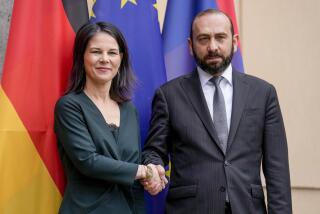Genscher Goes to Moscow for Day of Talks With Gromyko
- Share via
BONN — West German Foreign Minister Hans-Dietrich Genscher flew to Moscow on Sunday on a hastily arranged one-day trip for talks with his Soviet counterpart, Andrei A. Gromyko, reportedly to underscore West European interest in the upcoming Geneva nuclear arms talks.
Genscher is also expected to try to prevent further deterioration of Soviet-West German bilateral ties, which have been severely strained by a prolonged anti-German propaganda campaign from Moscow.
The visit, apparently arranged at Genscher’s request, was announced only hours before his departure early Sunday evening.
It marks the first bilateral contact at the foreign minister level between the two countries since February of last year, when Genscher flew to Moscow for the funeral of the President Yuri V. Andropov.
Substantial Trade Interests
For West Germany, one of the most important members of the Western Alliance, relations with the East are extremely important. In addition to 19 million Germans who live in the Soviet Bloc, Bonn also has substantial trade interests there.
Because of these interests and West Germany’s geographical position at the heart of Central Europe, Bonn has consistently been among the strongest advocates of easing overall East-West tensions.
Genscher stressed this theme in pre-departure interviews with both national television networks.
“We’ve always played an important role (in East-West relations), and as developments move into a more intensive phase, we need to make our own contribution,” he said. “We can’t just leave things to others.”
Foreign Ministry officials in Bonn indicated that Genscher wanted to meet with Gromyko before the start of arms talks March 12 to stress West German hopes for a positive dialogue in Geneva.
Moscow’s relations with Bonn soured shortly after deployment of the U.S. Pershing 2 nuclear missiles began in West Germany following a tumultuous public debate in 1983. They have never recovered.
Pressure From Kremlin
In addition to an aggressive propaganda campaign, the Soviets have also frozen Bonn’s ostpolitik program--the warming of relations with its Eastern neighbors--by pressuring East German and Bulgarian leaders to give up planned visits to West Germany last year.
The anti-German propaganda campaign appears as much a part of Moscow’s buildup to large celebrations marking the 40th anniversary of the Allied victory over Nazi Germany next May 8 as it is a reaction to the Pershing 2 missile deployment.
More to Read
Sign up for Essential California
The most important California stories and recommendations in your inbox every morning.
You may occasionally receive promotional content from the Los Angeles Times.













